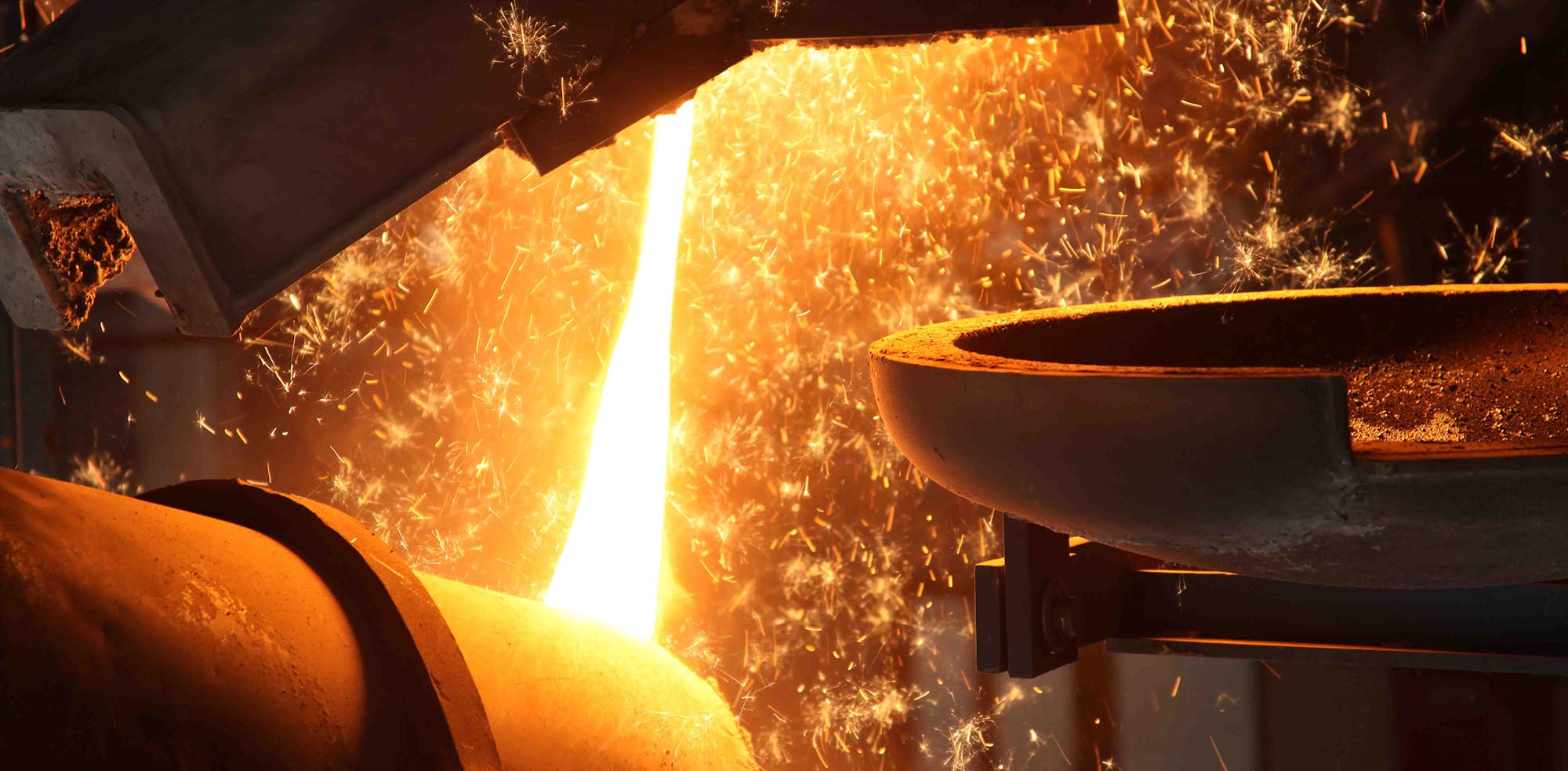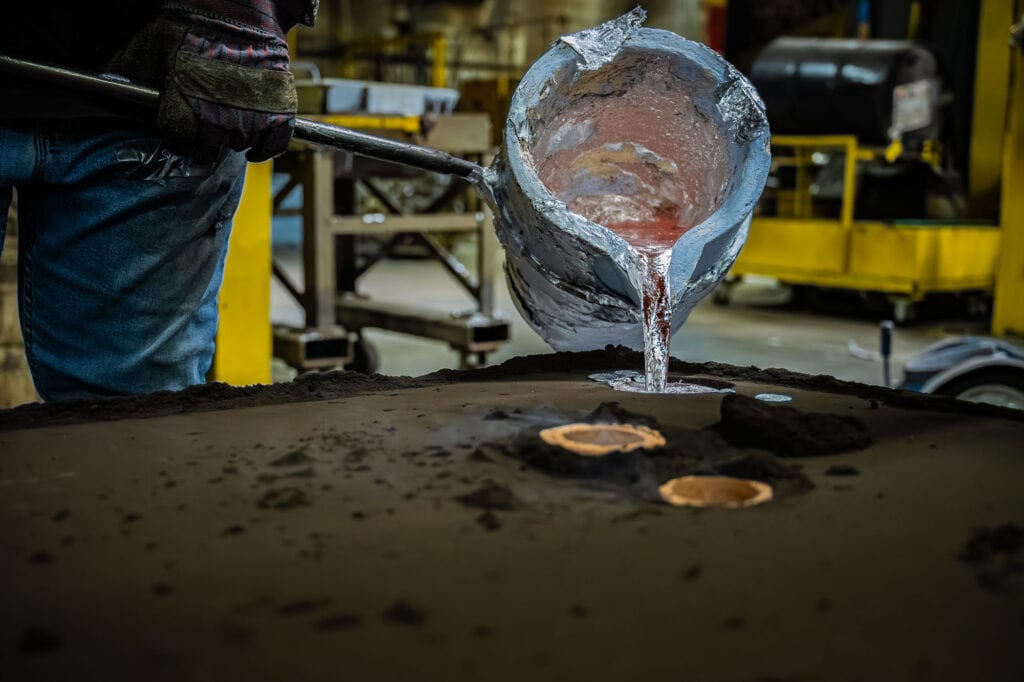Environmental impact in today’s Aluminum Foundry operations
Wiki Article
Exactly How a Metal Foundry Adds To Lasting Metal Manufacturing Practices
Metal foundries play an important function in promoting sustainability within the metal production market. By including recycled products, they lower dependence on virgin sources and lessen environmental impacts. Energy-efficient melting processes additionally decrease power usage and discharges. The journey toward sustainable practices involves even more than simply reusing and power administration. It includes a wider commitment to honest sourcing and innovative innovations. The implications of these practices are substantial and warrant more detailed exam.The Role of Recycling in Metal Foundries
While metal production has traditionally counted on virgin products, the boosting emphasis on sustainability has actually resulted in a significant change in techniques, especially in metal foundries. Recycling has become an important element of this improvement, allowing foundries to repurpose scrap metal and lower dependence on mined sources. By integrating recycled products into their procedures, foundries not just reduce ecological effect yet additionally lower manufacturing costs.Making use of recycled steels, such as aluminum, copper, and steel, lessens energy intake and decreases greenhouse gas exhausts connected with typical mining and refining techniques. In addition, foundries can accomplish high-quality outcomes by using sophisticated sorting and handling technologies to ensure the pureness of recycled products. This emphasis on recycling fosters a round economy, where waste is lessened, and sources are utilized effectively. Metal foundries play a pivotal role in promoting lasting practices within the metal production market.
Energy-Efficient Melting Methods
Energy-efficient melting methods are crucial for enhancing sustainability in metal production. These methods substantially lower power intake throughout the melting procedure, which is one of the most energy-intensive stages in metal manufacturing. Technologies such as induction melting, resistance heating, and microwave melting offer enhanced performance contrasted to typical approaches. Induction melting, for example, uses magnetic fields to generate warm directly within the metal, reducing energy loss and offering accurate temperature control.Additionally, carrying out warm healing systems can even more improve efficiency by recycling and recording waste warm produced during melting. Employing advanced insulation products and enhancing heating system designs also add to power savings. By taking on these cutting-edge melting methods, metal foundries can lower their carbon footprint, lower functional costs, and add to a much more sustainable production landscape. The assimilation of energy-efficient methods not only straightens with environmental goals yet likewise fulfills the growing demand for liable manufacturing techniques in the metal market.
Sustainable Sourcing of Raw Products
Lasting sourcing of resources is important for decreasing the ecological influence of metal manufacturing. This entails the boosted utilization of recycled steels, the fostering of honest mining techniques, and initiatives focused on local sourcing. By focusing on these approaches, the market can promote accountable resource administration and support regional economic situations.
Recycled Metal Utilization
How can sectors efficiently minimize their environmental effect while fulfilling the expanding demand for metal? One significant technique is the usage of recycled metal. By including scrap metal right into their manufacturing procedures, foundries can reduce the removal of virgin products, thus reducing and saving natural resources energy intake. Recycled steels require less energy to process compared to their raw counterparts, resulting in reduced greenhouse gas exhausts. In addition, using recycled metal helps divert waste from landfills, promoting a circular economy. Industries that prioritize recycled metal not only contribute to sustainability but additionally gain from price financial savings connected with lowered product purchase. Recycled metal usage stands as a vital technique for ecologically responsible metal production.Ethical Mining Practices
While the demand for metals continues to rise, industries are increasingly recognizing the importance of moral mining techniques in making certain liable sourcing of basic materials. Honest mining includes a commitment to ecological stewardship, social obligation, and adherence to reasonable labor techniques. Business are now prioritizing partnerships with mines that show openness in their procedures, decreasing environmental effect and respecting regional areas. This method not just promotes a lasting supply chain yet likewise enhances the track record of businesses entailed. By implementing extensive requirements and accreditations, industries can combat prohibited mining activities and advertise the welfare of workers. Inevitably, moral mining practices contribute substantially to a more lasting metal manufacturing ecological community, lining up economic growth with social and ecological integrity.Local Sourcing Efforts

Developments in Metal Casting Processes
Technologies in metal casting procedures are changing the industry by integrating advanced recycling strategies that minimize waste. Energy-efficient melting methods are also being created to minimize energy consumption during manufacturing. Additionally, the usage of cutting-edge mold and mildew products adds to improved efficiency and sustainability in casting procedures.Advanced Recycling Techniques
Advanced recycling techniques are transforming metal casting processes, greatly improving sustainability in the industry. These advancements concentrate on recovering and reprocessing scrap metal, considerably minimizing waste and the requirement for virgin products. Strategies such as hydrometallurgy and pyrometallurgy enable foundries to draw out important metals from utilized components, making certain reliable source use. Additionally, progressed sorting and filtration modern technologies boost the quality of recycled steels, making them suitable for high-performance applications. This not only lessens the environmental footprint of metal production but also cultivates a round economic situation by promoting the reuse of products. As these recycling approaches proceed to evolve, they promise to even more simplify operations within foundries and add to a more sustainable metal production landscape.Energy-Efficient Melting Methods
While conventional melting approaches have actually long been the backbone of metal casting, recent improvements have actually introduced energy-efficient techniques that noticeably minimize power intake and discharges. Technologies such as induction melting and electrical arc heating systems have acquired prestige, enabling exact control over temperature and lowering the demand for fossil fuels. These methods not only improve energy efficiency however likewise promote quicker melting times, which equates to lower operational costs. In addition, technologies in warmth recuperation systems make it possible for foundries to catch and reuse excess heat generated throughout the melting procedure. This alternative technique to energy management not just sustains sustainable practices yet likewise settings metal foundries as leaders in the change towards greener manufacturing processes, further aligning with global sustainability goals.Ingenious Mold Materials
As the demand for more efficient and sustainable metal casting processes grows, the expedition of cutting-edge mold and mildew materials has become a centerpiece in the sector. Typical mold and mildew products typically add to environmental challenges, motivating the look for alternatives Aluminum Casting that minimize waste and energy intake. Recent innovations include the growth of recyclable compounds and eco-friendly binders, which not only improve mold performance yet likewise minimize environmental impact. Furthermore, making use of 3D printing innovation in mold and mildew development permits for elaborate styles that reduce product usage and make it possible for fast prototyping. These cutting-edge materials not just enhance casting accuracy however also align with sustainability goals, showcasing the market's dedication to decreasing its carbon impact while maintaining top quality manufacturing criteria.Decreasing Waste With Advanced Modern Technology
Innovative modern technologies are changing the metal production industry by substantially reducing waste and boosting performance. Advanced information analytics and machine knowing formulas allow foundries to maximize production processes, recognizing inefficiencies and lessening scrap material. Smart sensors monitor equipment performance in real-time, allowing for anticipating maintenance that decreases downtime and waste generation. Furthermore, additive manufacturing techniques, such as 3D printing, permit the production of complicated components with minimal product use, considerably decreasing waste contrasted to standard methods.
Moreover, closed-loop systems are coming to be a lot more prevalent, in which scrap metal and by-products are recycled back right into the production cycle, ensuring that products are utilized to their greatest capacity - Aluminum Foundry. This combination of modern technology not just advertises source preservation yet additionally boosts the general sustainability of metal manufacturing methods. By accepting these improvements, foundries can add to an extra sustainable future while maintaining competition in the market
The Effect of Foundries on Carbon Impact Reduction
Foundries play a necessary role in minimizing the carbon impact of the metal production market by applying various sustainable methods. By making use of energy-efficient technologies, such as electric arc heating systems, these centers considerably lower greenhouse gas discharges compared to standard methods. Additionally, foundries significantly take on renewable resource sources, which additionally reduces their reliance on fossil gas.Reusing scrap metal is one more essential method that foundries employ, saving sources and lowering the need for virgin materials. This not just minimizes waste yet also minimizes the energy-intensive removal procedures related to mining. The adoption of closed-loop water systems aids to minimize water use and decrease wastewater discharge, adding to a more lasting operation.
With these efforts, foundries demonstrate their commitment to ecological stewardship, bring about a significant reduction in the overall carbon footprint of the metal manufacturing market. Their continuous efforts are pivotal in the shift toward an extra sustainable commercial landscape.
Regularly Asked Inquiries
What Kinds of Metals Are Most Commonly Recycled in Foundries?
Aluminum, brass, copper, and steel are amongst one of the most generally recycled steels in foundries. These steels are favored because of their high recycling rates, economic worth, and prevalent availability, contributing significantly to industrial sustainability efforts.How Do Foundries Ensure the Top Quality of Recycled Materials?
Foundries determine the quality of recycled materials through strenuous screening, arranging, and filtration processes. They execute sophisticated modern technologies to assess make-up and remove contaminations, assuring that the recycled steels fulfill industry standards for performance and safety.
What Certifications Exist for Lasting Foundry Practices?
Different accreditations exist for sustainable foundry techniques, consisting of ISO 14001 for ecological monitoring, ISO 50001 for power monitoring, and LEED accreditation for sustainable structure practices (Metal Casting). These certifications aid ensure adherence to ecological and sustainability standards in proceduresJust How Do Foundries Determine Their Carbon Footprint Decrease?
Foundries measure carbon impact reduction with devices like lifecycle analyses, energy audits, and discharges tracking systems. They contrast standard emissions to present outcomes, reviewing improvements in energy effectiveness, product use, and renewable power adoption over time.What Are the Economic Benefits of Lasting Metal Production?
Lasting metal manufacturing supplies economic benefits such as reduced functional expenses, enhanced performance, improved market competitiveness, and prospective government rewards. Additionally, it fosters technology and brings in ecologically aware customers, ultimately driving long-lasting earnings for businesses.Metal foundries play a vital duty in advertising sustainability within the metal production market. While metal production has commonly counted on virgin products, the boosting emphasis on sustainability has led to a substantial change in methods, especially in metal foundries. By incorporating scrap metal right into their manufacturing processes, foundries can decrease the removal of virgin products, thereby saving natural resources and reducing energy intake. Foundries play a necessary function in reducing the carbon footprint of the metal manufacturing market by executing numerous lasting practices. Reusing scrap metal is one more crucial technique that foundries utilize, conserving sources and decreasing the need for virgin products.
Report this wiki page